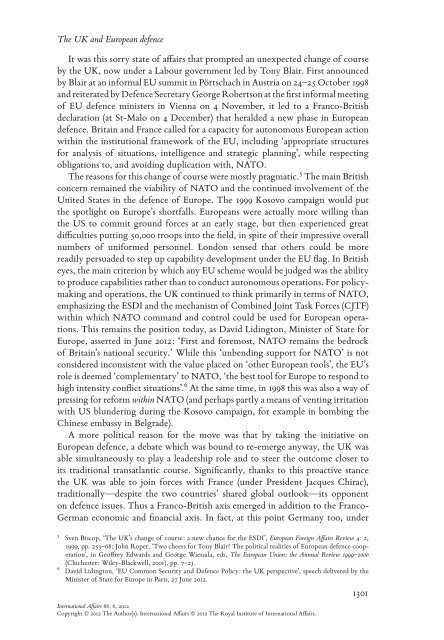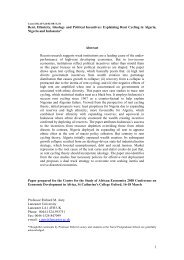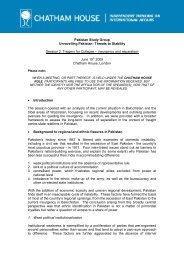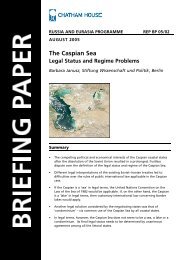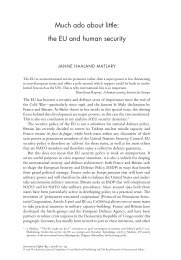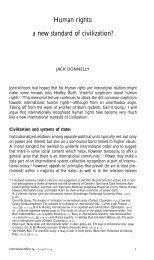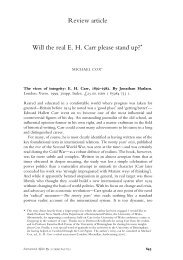The UK and European defence: leading or leaving? - Chatham House
The UK and European defence: leading or leaving? - Chatham House
The UK and European defence: leading or leaving? - Chatham House
Create successful ePaper yourself
Turn your PDF publications into a flip-book with our unique Google optimized e-Paper software.
<strong>The</strong> <strong>UK</strong> <strong>and</strong> <strong>European</strong> <strong>defence</strong><br />
It was this s<strong>or</strong>ry state of affairs that prompted an unexpected change of course<br />
by the <strong>UK</strong>, now under a Labour government led by Tony Blair. First announced<br />
by Blair at an inf<strong>or</strong>mal EU summit in Pörtschach in Austria on 24–25 October 1998<br />
<strong>and</strong> reiterated by Defence Secretary Ge<strong>or</strong>ge Robertson at the first inf<strong>or</strong>mal meeting<br />
of EU <strong>defence</strong> ministers in Vienna on 4 November, it led to a Franco-British<br />
declaration (at St-Malo on 4 December) that heralded a new phase in <strong>European</strong><br />
<strong>defence</strong>. Britain <strong>and</strong> France called f<strong>or</strong> a capacity f<strong>or</strong> autonomous <strong>European</strong> action<br />
within the institutional framew<strong>or</strong>k of the EU, including ‘appropriate structures<br />
f<strong>or</strong> analysis of situations, intelligence <strong>and</strong> strategic planning’, while respecting<br />
obligations to, <strong>and</strong> avoiding duplication with, NATO.<br />
<strong>The</strong> reasons f<strong>or</strong> this change of course were mostly pragmatic. 5 <strong>The</strong> main British<br />
concern remained the viability of NATO <strong>and</strong> the continued involvement of the<br />
United States in the <strong>defence</strong> of Europe. <strong>The</strong> 1999 Kosovo campaign would put<br />
the spotlight on Europe’s sh<strong>or</strong>tfalls. <strong>European</strong>s were actually m<strong>or</strong>e willing than<br />
the US to commit ground f<strong>or</strong>ces at an early stage, but then experienced great<br />
difficulties putting 50,000 troops into the field, in spite of their impressive overall<br />
numbers of unif<strong>or</strong>med personnel. London sensed that others could be m<strong>or</strong>e<br />
readily persuaded to step up capability development under the EU flag. In British<br />
eyes, the main criterion by which any EU scheme would be judged was the ability<br />
to produce capabilities rather than to conduct autonomous operations. F<strong>or</strong> policymaking<br />
<strong>and</strong> operations, the <strong>UK</strong> continued to think primarily in terms of NATO,<br />
emphasizing the ESDI <strong>and</strong> the mechanism of Combined Joint Task F<strong>or</strong>ces (CJTF)<br />
within which NATO comm<strong>and</strong> <strong>and</strong> control could be used f<strong>or</strong> <strong>European</strong> operations.<br />
This remains the position today, as David Lidington, Minister of State f<strong>or</strong><br />
Europe, asserted in June 2012: ‘First <strong>and</strong> f<strong>or</strong>emost, NATO remains the bedrock<br />
of Britain’s national security.’ While this ‘unbending supp<strong>or</strong>t f<strong>or</strong> NATO’ is not<br />
considered inconsistent with the value placed on ‘other <strong>European</strong> tools’, the EU’s<br />
role is deemed ‘complementary’ to NATO, ‘the best tool f<strong>or</strong> Europe to respond to<br />
high intensity conflict situations’. 6 At the same time, in 1998 this was also a way of<br />
pressing f<strong>or</strong> ref<strong>or</strong>m within NATO (<strong>and</strong> perhaps partly a means of venting irritation<br />
with US blundering during the Kosovo campaign, f<strong>or</strong> example in bombing the<br />
Chinese embassy in Belgrade).<br />
A m<strong>or</strong>e political reason f<strong>or</strong> the move was that by taking the initiative on<br />
<strong>European</strong> <strong>defence</strong>, a debate which was bound to re-emerge anyway, the <strong>UK</strong> was<br />
able simultaneously to play a leadership role <strong>and</strong> to steer the outcome closer to<br />
its traditional transatlantic course. Significantly, thanks to this proactive stance<br />
the <strong>UK</strong> was able to join f<strong>or</strong>ces with France (under President Jacques Chirac),<br />
traditionally—despite the two countries’ shared global outlook—its opponent<br />
on <strong>defence</strong> issues. Thus a Franco-British axis emerged in addition to the Franco-<br />
German economic <strong>and</strong> financial axis. In fact, at this point Germany too, under<br />
5 Sven Biscop, ‘<strong>The</strong> <strong>UK</strong>’s change of course: a new chance f<strong>or</strong> the ESDI’, <strong>European</strong> F<strong>or</strong>eign Affairs Review 4: 2,<br />
1999, pp. 253–68; John Roper, ‘Two cheers f<strong>or</strong> Tony Blair? <strong>The</strong> political realities of <strong>European</strong> <strong>defence</strong> cooperation’,<br />
in Geoffrey Edwards <strong>and</strong> Ge<strong>or</strong>ge Wiessala, eds, <strong>The</strong> <strong>European</strong> Union: the Annual Review 1999–2000<br />
(Chichester: Wiley-Blackwell, 2001), pp. 7–23.<br />
6 David Lidington, ‘EU Common Security <strong>and</strong> Defence Policy: the <strong>UK</strong> perspective’, speech delivered by the<br />
Minister of State f<strong>or</strong> Europe in Paris, 27 June 2012.<br />
International Affairs 88: 6, 2012<br />
Copyright © 2012 <strong>The</strong> Auth<strong>or</strong>(s). International Affairs © 2012 <strong>The</strong> Royal Institute of International Affairs.<br />
1301


